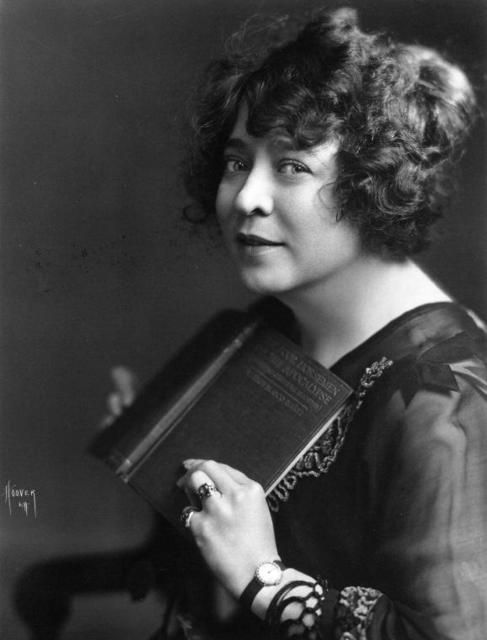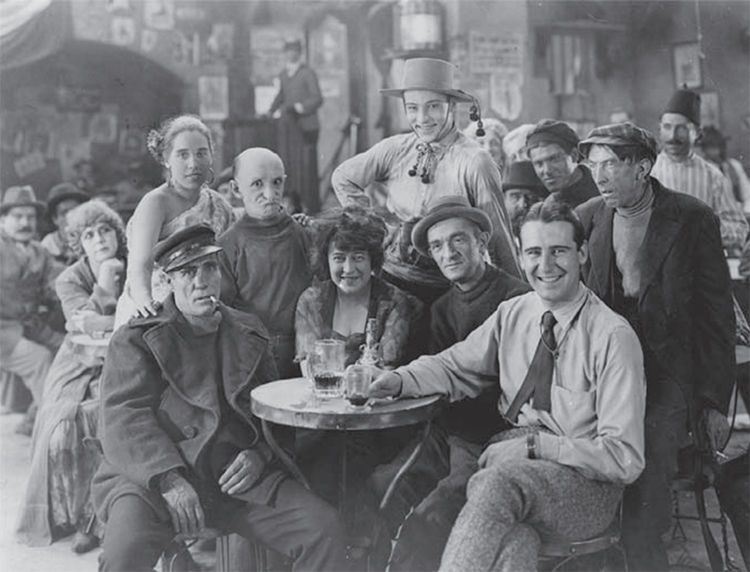June Mathis
- SilentCinemaSchool

- May 8, 2020
- 4 min read
Updated: May 12, 2022
Distinguished readers : *drumroll please* ...June Mathis.
...WHO?!

1887 - 1927
June was not just any old screenwriter. This amazing woman was once the highest-paid executive in Hollywood – and the ONLY female executive at Metro Pictures (later known as MGM). The Los Angeles Times once called her position “The Most Responsible Job ever Held by A Woman”, and she was also one of the first writer-directors, often co-directing her own scripts alongside an established director. Casting was often her domain as well. This lady. Was fierce.
June was a sickly child, but managed to regain her health as she got older. She always believed that she healed herself through her own willpower (quite possible in her case, I mean..). As a teenager, she became a vaudeville performer and eventually a stage actress on Broadway. June would continue performing into adulthood, financially supporting her twice-widowed mother, Virginia.

The queen on her throne ♛
The career of screenwriting was what June really had her heart set on, so she entered a writing competition. She didn’t win, but her entry was so good that she got some job offers. Eventually, she was head of the entire script department at Metro. Get it, girl! June’s scripts were some of the first to include stage directions. Many standard writing styles of today come from her own pioneering! She once said:
“No story that did not possess a theme has ever really lived. Occasionally one may make money and perhaps be popular for a time. But in the end it dies.”
Take that, every Hallmark movie in existence…

June (center) with the cast of "The Four Horsemen of The Apocalypse" (1921)

June and her dear friend Rudolph on the set of "Blood and Sand" (1922)
In 1921, June made a discovery that would change her life - and elevate her status in the film industry. She had seen (who else??) Rudolph Valentino in a small role and thought he would be perfect for Metro’s latest film: "The Four Horsemen Of The Apocalypse". The studio heads weren’t sure about casting an unknown actor in a lead role, but the mighty June convinced them. Thus began a long, devoted friendship between the two. She was 8 years older than Rudolph, so she was sort of a "mom" to him. It's said that he affectionately called her "little mother". In a 1923 interview, Rudolph said of June;
“She discovered me, anything I have accomplished I owe to her, to her judgment, to her advice and to her unfailing patience and confidence in me.”
Because of her discovery of the biggest star of the silent era, and the close bond they had, June ended up working at Paramount along with Rudolph after the studio promised that she could write his scripts. However, after his marriage to the “lovely” (albeit controlling) Natacha, his friendship with June suffered and for a while they stopped all communication. Spoiler alert: they made up after his divorce.

Goofing off with her husband, Sylvano Balboni. Married in 1924.

Being a woman in a male-dominated industry wasn’t easy. Is it ever?? In 1924, MGM took a completed film (“Greed”) and essentially threw it into June’s hands, telling her to have it edited from about 4 hours of film down to a mere 2 (!), and edit the script to match when necessary. She did her best, and ultimately finished the film, as ordered by the studio. But because her name was on the final product, the director (Erich von Stroheim) and several other critics disapproved of her work, and accused her of personally tampering with the director's “genius”. But if a male writer had been responsible – it probably wouldn't have been as big of a deal...just saying.

As if the “Greed” thing wasn’t bad enough, in 1925 June had the idea of shooting MGM’s “Ben Hur” on location in Italy. However, once she’d arrived there, the director refused to let her “interfere”. There were tons of issues with filming; from the death of a stuntman to permission issues on where they could shoot. Just a hot mess all around. So MGM’s head of production (Louis B. Mayer) called everyone back to California and fired a lot of the production staff, including June. Most of the issues were more than likely due to the director's stubbornness, but when in doubt – fire everyone!

The now-lost hit, "The Magic Flame" (1927)
Despite these things, June continued writing and was even offered a position as editorial director for First National Pictures. Her last film was 1927’s "The Magic Flame" (allegedly one of her best movies). June was at the height of her success when in 1927, she and her mother went to a Broadway show. During the show, June suddenly cried out “Mother, I’m dying!” and suffered a fatal heart attack. She was 40 years old. Because Rudolph Valentino’s remains were still inside their dual crypt, June’s husband Sylvano decided not to “evict” him, and had June buried next to Rudolph. Today, we can all greatly appreciate the priceless contributions she made, paving the way for future generations of writers, producers and directors. Long live the queen!
References:


.png)



Comments